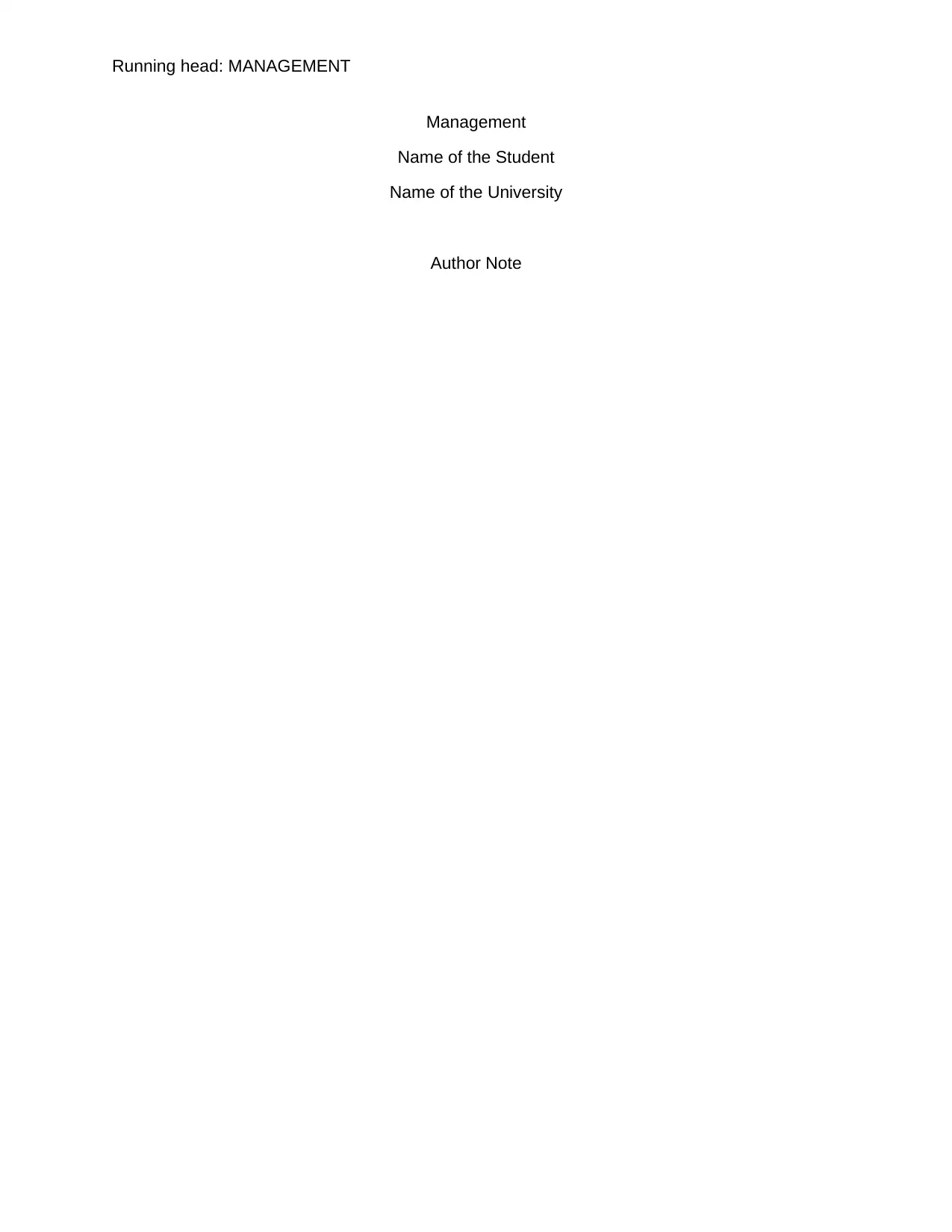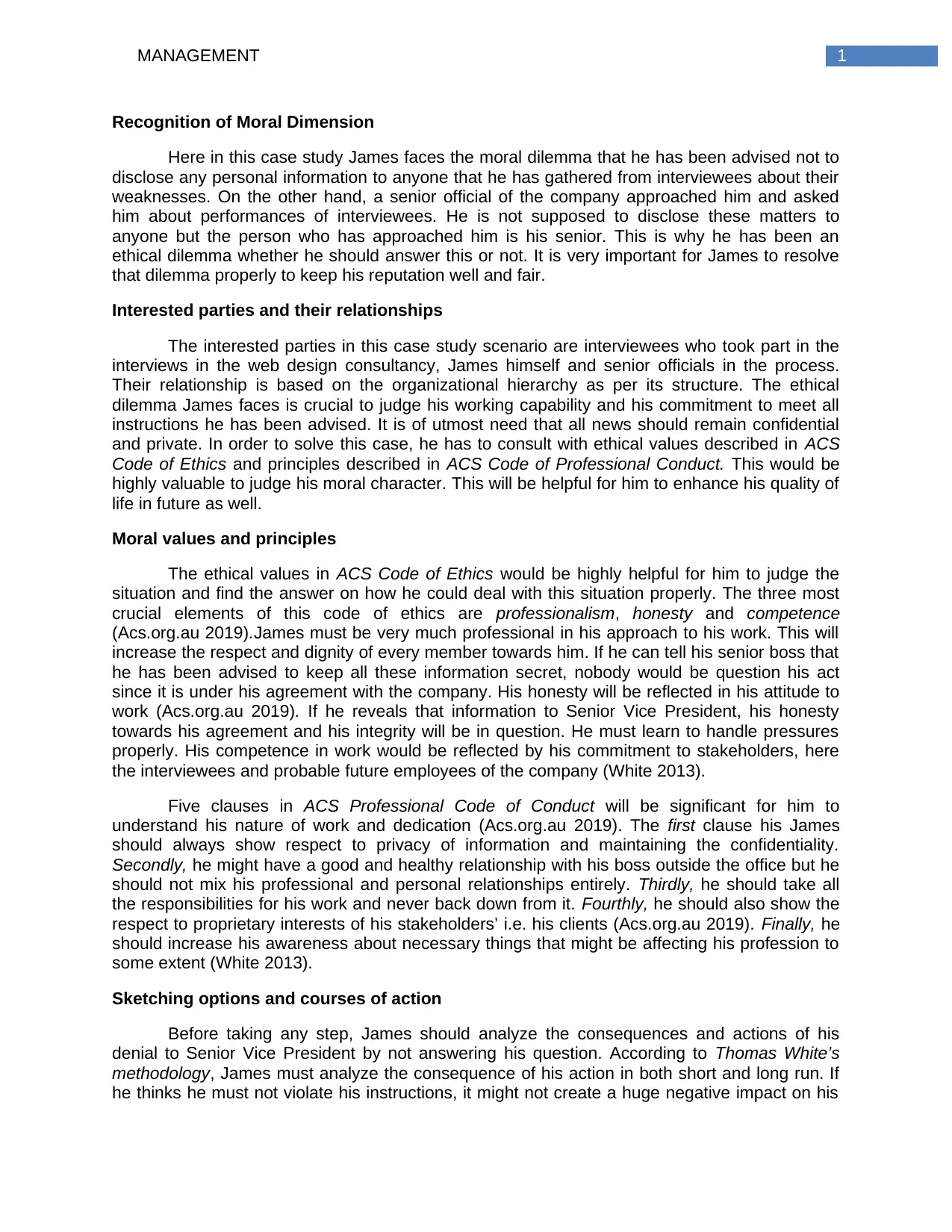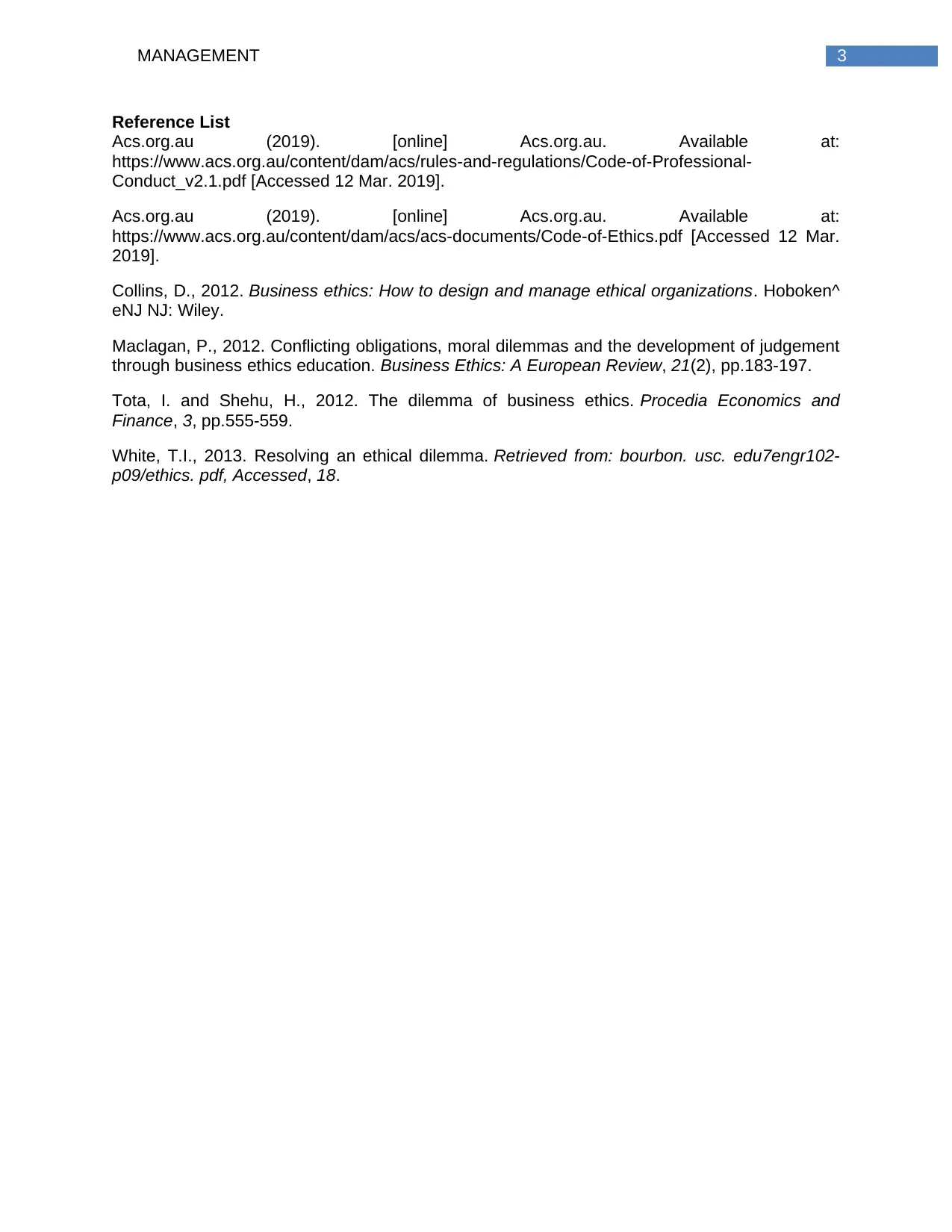Recognition of Moral Dimension
VerifiedAdded on 2023/04/06
|4
|994
|412
AI Summary
This case study explores the moral dilemma faced by James, who is advised not to disclose personal information gathered from interviewees. He is approached by a senior official and must decide whether to answer or not. The case examines the interested parties, moral values and principles, options and courses of action, benefits and burdens, and recommendations.
Contribute Materials
Your contribution can guide someone’s learning journey. Share your
documents today.

Running head: MANAGEMENT
Management
Name of the Student
Name of the University
Author Note
Management
Name of the Student
Name of the University
Author Note
Secure Best Marks with AI Grader
Need help grading? Try our AI Grader for instant feedback on your assignments.

1MANAGEMENT
Recognition of Moral Dimension
Here in this case study James faces the moral dilemma that he has been advised not to
disclose any personal information to anyone that he has gathered from interviewees about their
weaknesses. On the other hand, a senior official of the company approached him and asked
him about performances of interviewees. He is not supposed to disclose these matters to
anyone but the person who has approached him is his senior. This is why he has been an
ethical dilemma whether he should answer this or not. It is very important for James to resolve
that dilemma properly to keep his reputation well and fair.
Interested parties and their relationships
The interested parties in this case study scenario are interviewees who took part in the
interviews in the web design consultancy, James himself and senior officials in the process.
Their relationship is based on the organizational hierarchy as per its structure. The ethical
dilemma James faces is crucial to judge his working capability and his commitment to meet all
instructions he has been advised. It is of utmost need that all news should remain confidential
and private. In order to solve this case, he has to consult with ethical values described in ACS
Code of Ethics and principles described in ACS Code of Professional Conduct. This would be
highly valuable to judge his moral character. This will be helpful for him to enhance his quality of
life in future as well.
Moral values and principles
The ethical values in ACS Code of Ethics would be highly helpful for him to judge the
situation and find the answer on how he could deal with this situation properly. The three most
crucial elements of this code of ethics are professionalism, honesty and competence
(Acs.org.au 2019).James must be very much professional in his approach to his work. This will
increase the respect and dignity of every member towards him. If he can tell his senior boss that
he has been advised to keep all these information secret, nobody would be question his act
since it is under his agreement with the company. His honesty will be reflected in his attitude to
work (Acs.org.au 2019). If he reveals that information to Senior Vice President, his honesty
towards his agreement and his integrity will be in question. He must learn to handle pressures
properly. His competence in work would be reflected by his commitment to stakeholders, here
the interviewees and probable future employees of the company (White 2013).
Five clauses in ACS Professional Code of Conduct will be significant for him to
understand his nature of work and dedication (Acs.org.au 2019). The first clause his James
should always show respect to privacy of information and maintaining the confidentiality.
Secondly, he might have a good and healthy relationship with his boss outside the office but he
should not mix his professional and personal relationships entirely. Thirdly, he should take all
the responsibilities for his work and never back down from it. Fourthly, he should also show the
respect to proprietary interests of his stakeholders’ i.e. his clients (Acs.org.au 2019). Finally, he
should increase his awareness about necessary things that might be affecting his profession to
some extent (White 2013).
Sketching options and courses of action
Before taking any step, James should analyze the consequences and actions of his
denial to Senior Vice President by not answering his question. According to Thomas White’s
methodology, James must analyze the consequence of his action in both short and long run. If
he thinks he must not violate his instructions, it might not create a huge negative impact on his
Recognition of Moral Dimension
Here in this case study James faces the moral dilemma that he has been advised not to
disclose any personal information to anyone that he has gathered from interviewees about their
weaknesses. On the other hand, a senior official of the company approached him and asked
him about performances of interviewees. He is not supposed to disclose these matters to
anyone but the person who has approached him is his senior. This is why he has been an
ethical dilemma whether he should answer this or not. It is very important for James to resolve
that dilemma properly to keep his reputation well and fair.
Interested parties and their relationships
The interested parties in this case study scenario are interviewees who took part in the
interviews in the web design consultancy, James himself and senior officials in the process.
Their relationship is based on the organizational hierarchy as per its structure. The ethical
dilemma James faces is crucial to judge his working capability and his commitment to meet all
instructions he has been advised. It is of utmost need that all news should remain confidential
and private. In order to solve this case, he has to consult with ethical values described in ACS
Code of Ethics and principles described in ACS Code of Professional Conduct. This would be
highly valuable to judge his moral character. This will be helpful for him to enhance his quality of
life in future as well.
Moral values and principles
The ethical values in ACS Code of Ethics would be highly helpful for him to judge the
situation and find the answer on how he could deal with this situation properly. The three most
crucial elements of this code of ethics are professionalism, honesty and competence
(Acs.org.au 2019).James must be very much professional in his approach to his work. This will
increase the respect and dignity of every member towards him. If he can tell his senior boss that
he has been advised to keep all these information secret, nobody would be question his act
since it is under his agreement with the company. His honesty will be reflected in his attitude to
work (Acs.org.au 2019). If he reveals that information to Senior Vice President, his honesty
towards his agreement and his integrity will be in question. He must learn to handle pressures
properly. His competence in work would be reflected by his commitment to stakeholders, here
the interviewees and probable future employees of the company (White 2013).
Five clauses in ACS Professional Code of Conduct will be significant for him to
understand his nature of work and dedication (Acs.org.au 2019). The first clause his James
should always show respect to privacy of information and maintaining the confidentiality.
Secondly, he might have a good and healthy relationship with his boss outside the office but he
should not mix his professional and personal relationships entirely. Thirdly, he should take all
the responsibilities for his work and never back down from it. Fourthly, he should also show the
respect to proprietary interests of his stakeholders’ i.e. his clients (Acs.org.au 2019). Finally, he
should increase his awareness about necessary things that might be affecting his profession to
some extent (White 2013).
Sketching options and courses of action
Before taking any step, James should analyze the consequences and actions of his
denial to Senior Vice President by not answering his question. According to Thomas White’s
methodology, James must analyze the consequence of his action in both short and long run. If
he thinks he must not violate his instructions, it might not create a huge negative impact on his

2MANAGEMENT
profession. His firmness in this situation might be appreciated in the long run. He might hurt the
ego of his Senior Vice President but he should stay strong to his duty. He should act fairly and
honestly according to moral principles.
Benefits and burdens
There are some benefits to his decision of not disclosing confidential information to his
senior. He must be aware that weak points of those interviewees would be analyzed later on but
there are always high chances of manipulation if he hands over this information to seniors
(Maclagan, 2012). His action would be appreciated when his act will come in front of everyone.
On the contrary, there are some burdens as his trustworthiness and healthy relationship with
Senior Vice President might be affected (White 2013).His professional future and remunerations
can be put in jeopardy by his senior boss. Then he should think he might have good prospects
in future if he stays true to his profession.
Discussing the relevance with others
His judgment will be very much relevant in this context since the futures of so many
interviewees lay in his hands. As they are still not employed, James should not disclose every
detailed fact to anyone.
Recommendations
It can be recommended from the case study that James should always be stern in his
duty and always follow advises given to him prior to starting his work. He should develop aan
idea about ACS Code of Ethics and ACS Code of Professional Conduct so he can deliver his
work by maintaining these ethical considerations. He will not be answerable to anyone if he
completes his work by implementing all the ethical codes.
profession. His firmness in this situation might be appreciated in the long run. He might hurt the
ego of his Senior Vice President but he should stay strong to his duty. He should act fairly and
honestly according to moral principles.
Benefits and burdens
There are some benefits to his decision of not disclosing confidential information to his
senior. He must be aware that weak points of those interviewees would be analyzed later on but
there are always high chances of manipulation if he hands over this information to seniors
(Maclagan, 2012). His action would be appreciated when his act will come in front of everyone.
On the contrary, there are some burdens as his trustworthiness and healthy relationship with
Senior Vice President might be affected (White 2013).His professional future and remunerations
can be put in jeopardy by his senior boss. Then he should think he might have good prospects
in future if he stays true to his profession.
Discussing the relevance with others
His judgment will be very much relevant in this context since the futures of so many
interviewees lay in his hands. As they are still not employed, James should not disclose every
detailed fact to anyone.
Recommendations
It can be recommended from the case study that James should always be stern in his
duty and always follow advises given to him prior to starting his work. He should develop aan
idea about ACS Code of Ethics and ACS Code of Professional Conduct so he can deliver his
work by maintaining these ethical considerations. He will not be answerable to anyone if he
completes his work by implementing all the ethical codes.

3MANAGEMENT
Reference List
Acs.org.au (2019). [online] Acs.org.au. Available at:
https://www.acs.org.au/content/dam/acs/rules-and-regulations/Code-of-Professional-
Conduct_v2.1.pdf [Accessed 12 Mar. 2019].
Acs.org.au (2019). [online] Acs.org.au. Available at:
https://www.acs.org.au/content/dam/acs/acs-documents/Code-of-Ethics.pdf [Accessed 12 Mar.
2019].
Collins, D., 2012. Business ethics: How to design and manage ethical organizations. Hoboken^
eNJ NJ: Wiley.
Maclagan, P., 2012. Conflicting obligations, moral dilemmas and the development of judgement
through business ethics education. Business Ethics: A European Review, 21(2), pp.183-197.
Tota, I. and Shehu, H., 2012. The dilemma of business ethics. Procedia Economics and
Finance, 3, pp.555-559.
White, T.I., 2013. Resolving an ethical dilemma. Retrieved from: bourbon. usc. edu7engr102-
p09/ethics. pdf, Accessed, 18.
Reference List
Acs.org.au (2019). [online] Acs.org.au. Available at:
https://www.acs.org.au/content/dam/acs/rules-and-regulations/Code-of-Professional-
Conduct_v2.1.pdf [Accessed 12 Mar. 2019].
Acs.org.au (2019). [online] Acs.org.au. Available at:
https://www.acs.org.au/content/dam/acs/acs-documents/Code-of-Ethics.pdf [Accessed 12 Mar.
2019].
Collins, D., 2012. Business ethics: How to design and manage ethical organizations. Hoboken^
eNJ NJ: Wiley.
Maclagan, P., 2012. Conflicting obligations, moral dilemmas and the development of judgement
through business ethics education. Business Ethics: A European Review, 21(2), pp.183-197.
Tota, I. and Shehu, H., 2012. The dilemma of business ethics. Procedia Economics and
Finance, 3, pp.555-559.
White, T.I., 2013. Resolving an ethical dilemma. Retrieved from: bourbon. usc. edu7engr102-
p09/ethics. pdf, Accessed, 18.
1 out of 4
Related Documents
Your All-in-One AI-Powered Toolkit for Academic Success.
+13062052269
info@desklib.com
Available 24*7 on WhatsApp / Email
![[object Object]](/_next/static/media/star-bottom.7253800d.svg)
Unlock your academic potential
© 2024 | Zucol Services PVT LTD | All rights reserved.





